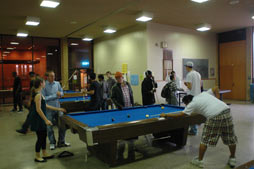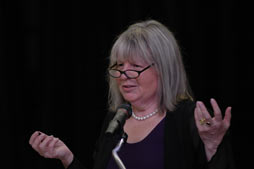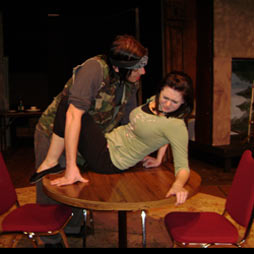By John Garces/sports editor

The game room at most colleges is supposed to be a place where students go to unwind and relax after class or a big test.
But at some colleges, an increasing number of students spend more of their time hanging out in the game room and less of their time studying and going to class.
On any given day, one can walk through the student center on any TCC campus and see students gathering to play pool, table tennis or air hockey.
Often, as it turns out, game room play comes at the expense of textbooks and studying for midterms.
“It’s a place where students can come and relax,” Sang Hung, NE Campus student, said. “They come here during class and skip so they can relax.”
Teachers, according to Hung, probably are not that concerned with the problem.
“They really wouldn’t care that much because the students have already paid money for that class,” he said.
Another NE Campus student sees it the same way.
“It’s a fun place; it’s better than class,” Lamar Flintroy said. “It’s a place to pass the time.”
Academic advisors, however, do not believe in the theory that students have already paid, so their teacher will not care if they come to class.
“It’s the student’s responsibility to go to class, not anybody else’s,” Sonja Butler, NE Campus academic advisor, said.
Students should at least stay out of the game room long enough to actually see if a teacher is teaching what they are paid to teach as well, Butler said.
“If students don’t go to class after they’ve paid for it, they don’t know whether a professor is teaching the course or not,” Linda Specks, NE academic counselor, said.
“They need to hold professors accountable,” she said.
Butler supports the game room, but knows there is an appropriate time for it to be used, such as after passing a big test.
“I want students to study as hard as they play,” she said.
Butler said college is a growing experience and not a place to waste a student’s hard-earned money.
“College is about growing, learning and experience, not agony,” she said. “It only gets boring if we let it. We (as staff) have to create something that’s positive every day.”
Ricks Edmondson, NW Campus director of counseling and testing, sees the game room as a place that can both help and hurt a student during the day.
“It can work for or against a student,” he said.
“If a student spends time in the game room instead of studying, it can hurt him,” he said. If you have studied for an test on the other hand, it can be good for recreation and relaxing.”
Butler and Flecks both want students to think long and hard about the choices they make before the next time they go to the game room when they should be in class.
“A student has a choice to make every day,” Butler said. “Every day you can choose to play your money away or get involved in the classroom experience.”

























